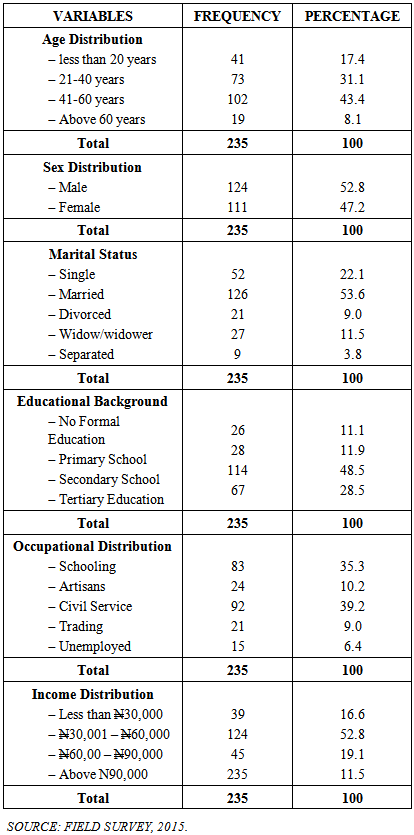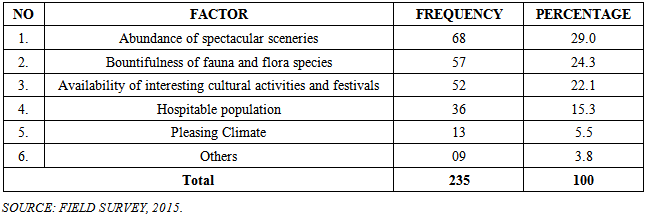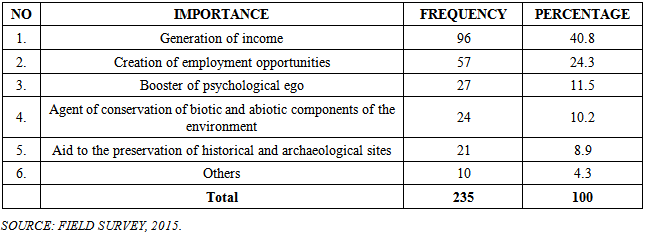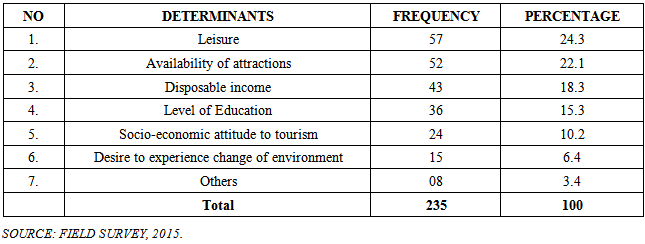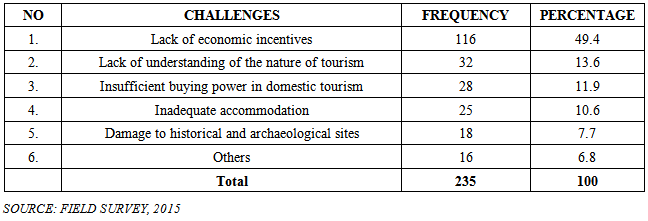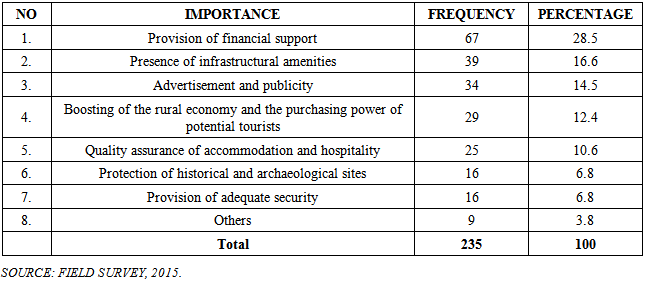-
Paper Information
- Paper Submission
-
Journal Information
- About This Journal
- Editorial Board
- Current Issue
- Archive
- Author Guidelines
- Contact Us
American Journal of Tourism Management
p-ISSN: 2326-0637 e-ISSN: 2326-0645
2015; 4(1): 18-25
doi:10.5923/j.tourism.20150401.03
Rural Tourism in Ekiti State, Nigeria: Issues, Trajectories, Opportunities Entrepreneurship and Implications for Rural Business Development
Ibimilua Adewale Festus 1, Ibimilua Foyeke Omoboye 2
1Department of Geography and Planning Science, Faculty of the Social Sciences, Ekiti State University, Ado Ekiti, Nigeria
2Department of Geography, School of Arts and Social Sciences, College of Education, Ikere Ekiti, Nigeria
Correspondence to: Ibimilua Adewale Festus , Department of Geography and Planning Science, Faculty of the Social Sciences, Ekiti State University, Ado Ekiti, Nigeria.
| Email: |  |
Copyright © 2015 Scientific & Academic Publishing. All Rights Reserved.
This study probes into the issues, trajectories, entrepreneurship and implications of rural tourism for business development in Ekiti State, Nigeria. The paper addresses the matters bordering on the benefits of rural tourism. The literature review presents a broader variety of viewpoints on motivational factors, impacts, business development and draw backs to sustainable rural tourism. In making research into this subject matter, 12 rural settlements were purposively selected for the study. Detailed case studies were conducted round the tourist attractions in the 12 selected settlements. The research instrument used for the study is questionnaire. Simple statistical tools were used in the interpretation of the data. The result of the study revealed that the study area is endowed with numerous tourist attractions. Nevertheless, rural tourism in the area is bedeviled by poor finance, inadequate awareness and education, lack of progress in developing the rural tourism potentials, inadequate legislation and weak judiciary on rural tourism resources management. Therefore, the study recommended adequate funding, awareness raising, turn-around maintenance of tourist attractions, active local community and private sector participation and responsible use of tourism facilities.
Keywords: Attraction, Craft, Facilities, Hospitality, Management
Cite this paper: Ibimilua Adewale Festus , Ibimilua Foyeke Omoboye , Rural Tourism in Ekiti State, Nigeria: Issues, Trajectories, Opportunities Entrepreneurship and Implications for Rural Business Development, American Journal of Tourism Management, Vol. 4 No. 1, 2015, pp. 18-25. doi: 10.5923/j.tourism.20150401.03.
Article Outline
1. Introduction
- Rural areas are very rich in flora, fauna and spectacular sceneries and geological features of national and international features. They are equally prosperous in festivals, cultural diversity and other tourism resources [1-9]. Participation in rural tourism is determined by economic factors like disposable income, tourism cost, marketing effectiveness, physical distance, cost of living, and relative price. The exogenous determinants of rural tourism include accessibility, safety, restrictions, socio-political considerations, facilities, and safety. The socio-psychological determinants include the amount of leisure time, motivation, benefit sought, travel preferences, family circumstances, past experience(s), image of the destination as well as cultural similarities or differences. Also, the availability of geographic scenes, accommodation, socio-cultural disposition of the people to tourism, and governmental regulations go a long way to determine the level of participation of the people in rural tourism.When planned and managed effectively, tourism can have minimal negative impact on natural environment and can act as a catalyst for social development and biodiversity conservation [10]. Specifically, rural tourism has many positive impacts on man and his environment. It helps in boosting local economic development. By local economic development, one is referring to the development of the economic situation or circumstances of the districts or rural communities [11]. In their own study, [12] divided the multiplier effects of rural tourism development on a country’s economy into transaction or sales, output, income, government as well as employment multiplier.Nevertheless, there are so many cogs in the wheel of rural tourism. For instance, [13] identified the major draw backs to sustainable use of tourism resources as inappropriate land use practices, inadequate information on environmental economics, distorted valuation of natural resources, as well as deterioration in the aesthetic quality of the landscape. Similarly, [14] identified the major obstacles to rural tourism as land use change, the spread of invasive species, over-exploitation and pollution. Also, [15] validated some of the challenges that are facing the tourism industry in Nigeria as poor administration unhygienic hospitality destinations, weak government policies and legislations as well as lack of skilled manpower.However, if rural tourism is well developed, it will aid the development of the region as well as the nation. Development of rural tourism entails the promotion of cultural activities in the rural areas, ennoblement of festivals, efficient use of natural resources, protection of the environment, preservation of cultural heritage, perpetuation of areas with rare habitats, natural resources management, rural tourism planning, and marketing of agrestic potentials. Again, [6] identified development factors in tourism as attractions, promotion, tourism infrastructure, services, hospitality and entrepreneurship. They identified the important factors needed for sustainable rural tourism as strategic planning, proper marketing as well as complete tourism package and technical assistance for tourism development.
2. Objectives of the Study
- The objectives of the study are to:(i) identify the rural tourism potentials of Ekiti State(ii) examine the benefits of rural tourism to Ekiti State, its citizenry, and holiday makers.(iii) find out the factors that stimulate rural tourism demand in Ekiti State.(iv) identify the prospects of rural tourism participation.(v) analyse the problems of rural tourist attractions in Ekiti State(vi) propose some ameliorative measures towards rural tourism development in Ekiti State and Nigeria.
3. Research Methods
- This study was carried out in Ekiti State, Nigeria. The study started with reconnaissance surveys to the rural tourism potentials in the state. Thereafter, twelve rural settlements were purposively selected for playing host to the different forms of tourist attractions. One rural settlement was selected from twelve local government areas of the state (Table 1). Relevant information for the study were gathered through observation, oral interviews, literature review, focus group discussions as well as Participant Participation Approach (PPA). The major instrument of data collection is questionnaire. Using close ended format, it elicits information on socio-economic variables of the respondents as well as the determinants, benefits, challenges, and strategies of prompting rural tourism. Two hundred and eighty eight copies of the questionnaire were randomly administered on the tourists at the attractions, members of the host communities, and administrators in the tourist attractions. Two hundred and thirty five copies of the questionnaire were correctly filled in and used for the purpose of this study. The information gathered formed the research data. Descriptive statistics such as frequently tables and percentages were used for data analysis.
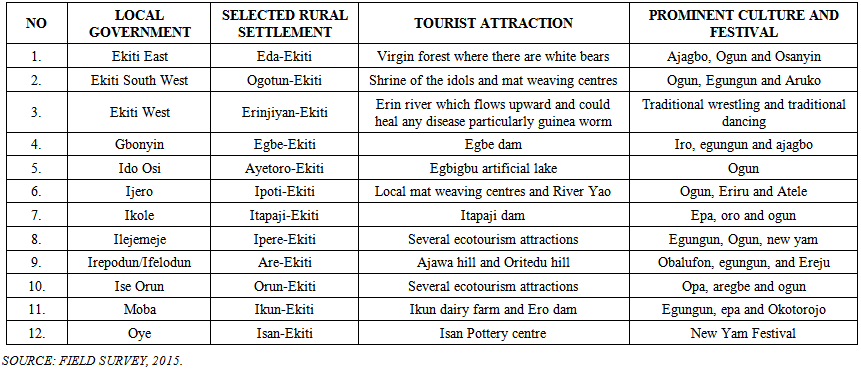 | Table 1. Selected Rural Settlements for the Study |
4. Opportunities in Rural Tourism
- The success of tourism industry in any region depends on the level of development of the elements. These elements to a very large extent dictate the volume of opportunities and benefits a region will derive from tourism [16]. The benefit of rural tourism is numerous. They include the values like economic, ecological, cultural, educational and aesthetics. Rural tourism helps in the conservation of the biotic and abiotic components of the environment. Consequently, environmental resources in some rural tourism potentials are suitable for the consumption of mankind. Furthermore, rural tourism helps in the diversification of the economy. The establishment of rural tourism potentials helps in the development of infrastructural amenities like potable water, electricity, communication, hospitals, bank, roads and markets. It is also responsible for the development of public utilities like restaurants, banks, resorts and postal agencies. Hence, it is an agent of sustainable development.Rural tourism offers many opportunities to the visitors, rural areas and the nation at large. Researches have confirmed that participation in rural tourism can improve physical, mental and moral health [6-8, 17-22]. Also, it offers unique opportunities for interaction with the rural environment. Consequently, it encourages holiday markers to enjoy the custom and culture of the rural areas. It is a remedy to stress related afflictions like stroke, sleeplessness and hypertension.Rural tourism is a good generator of economic wealth, an earner of foreign exchange and a major contributor to national balance of payment. It constitutes a major producer of revenue in countries like Spain, Carribean Island, Kenya, Zwitzerland, Tanzania and Morocco. [23] noted that communities in Chile protect their biodiversity because it provides the primary source of income for the indigenous inhabitants. Also, it is a provider of employment opportunities. It is a major employer of labour in countries like Italy, France, Australia, Brazil, Japan, Canada and United States of America. It is a significant donor to gross domestic product and a catalyst to regional development.Several other opportunities abound in rural tourism. They include creation of wealth in the rural community, promotion of culture and values, enhancement of the establishment of small scale industries, stimulation of rural development and promotion of the agricultural sector. Rural tourism makes ordinary life comfortable for rural dwellers, it allows the rural entrepreneurs to exhibit their capabilities, skills and technical knowledge. Thus, it opens up doors of rural business and it helps in the exploitation of the natural resources of the locality. Hence, rural tourism contributes to the provision of goods and services for the consumption of the people in the local community. Researches have confirmed that rural tourism can satisfy the need to relieve stress related anxieties [1, 6, 15, 18, 24, 25]. [24] identified some of the benefits of rural tourism as enhancement of quality of community life, sustainable way of life, involvement of local people, establishment of linkages with local entrepreneurs, change in economic structure of host community as well as prevention of biodiversity loss. Other benefits identified by him are promotion of academic research, opportunity for conservation of resources, land use diversification, stimulus to economic growth and occupational shift of rural dwellers. Rural tourism has less negative impact on natural resources than other types of tourism. It promotes the enjoyment and appreciation of the natural environment. In addition, it enhances the conservation of natural environment and habitats. Rural tourism is a major promoter of protected areas. It encourages the local people and visitors to participate in environmental management and conservation of resources. It is now universally agreed that the participation of local communities is an essential condition for the effectiveness and sustainability of natural resources management programmes [26].
5. Implications of Rural Tourism on Business Development and Entrepreneurship
- Tourism has many positive implications on business development and entrepreneurship. Specifically, rural tourism has contributed significantly to the development of many countrysides of the world. For instance, [19] submitted that Hong Kong has an extensive countryside offering natural ecology and scenic beauty across a variety of landscapes. They revealed further that the countryside have attracted heavy patronage from both local residents and foreign visitors for hiking, fitness exercise, barbecues, picnics and camping. Similarly, [6] opined that rural space cannot be considered any longer as being purely for agriculture. Rather, they have special appeal for tourists. They opined further that tourism is an agent of rural development in Romania as it offers opportunities for family business and small scale entrepreneurship. Many people like to travel to experience protected natural areas, and in so doing they create economic opportunities for residents living near those areas [27]. Tourism promotes rural entrepreneurship and business development. Entrepreneurship is a dynamic process of vision, change, and creation that requires an application of energy and passion towards the creation and implementation of new ideas and creative solutions [28]. Local craft industries are thriving in rural areas because of low capital requirement, availability of local market, small labour force requirement, limited floor space precondition and non-reliance on electricity.Rural tourism is driven by the presence of several destination attractions like culture, festivals, landscapes, flora, fauna, monuments and other geographical features. Other important attractions are opportunities for social encounters, customs, historical and modern architecture, arts as well as music. There surely are talents and other kinds of creative potentials in the localities-important sources of human resources-which can be tapped by local enterprises for the benefit of both the entrepreneur and the talented and skillful individuals of the locality [11]. The driving force behind sustainable rural tourism in Ekiti State, Nigeria is small and medium scale industries. They encourage entrepreneurship and self-help. These small and medium scale industries are stimulated by trade-based cooperative societies.The wealth generated in villages through self-reliance and careful management of the local natural resources base, supported a range of skilled artisans producing a great variety of renowned and widely traded goods [29]. Rural business development and entrepreneurship is supported and encouraged by agriculture. The goal of rural agriculture is to guarantee food security, create and spread employment, provide raw materials for industries and alleviate poverty. All the same, agricultural sector has been seen as a major basis of sustainable tourism [6, 22, 23, 30, 31, 32]. Small and Medium Scale Enterprises (SME) are dominant part of the Ekiti State Economy [33]. The SMEs in the state comprise of cottage industries, micro industries, small scale industries and medium scale industries. Some of these industries rely on agricultural products as their raw materials. In all, the tourism potentials of rural areas have provided global opportunities for business and entrepreneurship.
6. Challenges of Rural Tourism
- Major challenges to rural tourism development are inadequate resources, poor funding, deficient management, insufficient facility development, insecurity and poor transportation system. Other constraints are political instability, ineffective publicity, illegal harvesting of resources and deforestation. [15] noted that rural tourism is faced with problems like poor hospitality destination, weak administration, governmental policies and legislations as well as lack of skilled manpower. Moreover, rural tourism is faced with challenges like slash and burn agricultural practice, hunting for bush meat which threatens endangered species, ineffective management of botanical gardens, zoos, game parks and animal research centres in rural areas, and inadequate monitoring and protection of areas of outstanding beauty.A key threat is that human activity on a ‘business-as-usual’ basis will significantly disrupt or damage natural systems so that the earth’s carrying capacity is both exceeded and degraded [34]. In this sense, rural tourism will be greatly affected in terms of the level of attraction and participation in tourism activities. Sustainable rural tourism is threatened by inadequate environmental economics, distorted valuation of natural resources as well as deterioration of the aesthetic quality of the landscape. In the recent time, the scourge of ebola and other pernicious diseases have threatened rural tourism. Likewise, rural tourism is threatened in some localities by the fear of criminalities, violence and insecurity. [see 5 for instance].
7. Finding and Discussion
- Rural tourism resources available in Ekiti State, Nigeria are numerous and divergent. They include forest reserves, rivers, dams, lakes, hills, dairy farms and several cultural activities and festivals. Also, the main crafts in the state include weaving, pottery, wood carving, dyeing, cloth making, metal fabrication and black smiting. Hence, the state is blessed with different forms of tourism (leisure, wildlife historical, cultural, sport, religious, adventures, safari, ecotourism etc.) and tremendous prospects for entrepreneurship. The state is also noted for several agricultural products which serve as a booster to rural tourism. Among them are palm oil, yam, cassava, maize, plantain, rice, tomatoes, okro, cocoyam, alligator pepper, pine apple, melon and potato. Major cash crops in the state are cocoa, oil palm, kolanut, coffee, cashew and orange. Participants in rural tourism in the study area cut across several socio-economic characteristics. The variables are presented in Table 2.
|
|
|
|
|
|
|
8. Recommendations
- Sustainable rural tourism requires the collaborative effort of host communities, developers, conservationists, tourists, private organizations, government, non-governmental organizations, community based organizations and donors. It entails the cooperation of other stake holders like environmentalist, hotel owners, tour guides and transportation providers. It also involves the mobilization and motivation of schools, hunters, youth groups, interest groups and all sectors of the society. Tourism development should be made a top priority sector of the government development programmes. Also, tourism education should extend to secondary schools and national youth corps members should be encouraged to join tourism and culture clubs. Likewise, for the attainment of sustainable tourism, women should be empowered and encouraged to participate fully. In addition, local tourism products should be advertised, promoted and marketed in trade fairs, embassies, ministries, hospitality centres and websites.Furthermore, this study recommends the protection of the environment and tourism resources, enactment and enforcement of law, changes in public behaviours towards biological diversity and the abiotic components of the environment, conservation of natural habitats, promotion of culture and festivals, and provision of utilities. Other recommendation are preservation of nature reserves, turn-around maintenance of tourist attractions, development of local capacity to support citizen participation in tourism development as well as the involvement of private organizations, community based organizations and local institutions. The promotion of rural tourism should embrace the preservation of the species in the wild from threat, responsible use of tourism facilities, implementation of ecotourism proposals as well as construction and maintenance of rural roads for easy accessibility. The promotion of rural tourism should encompass the promotion of nature-based tourism, espousal of rural cultural activities, sustainable management of national assets, renewable energy development, improvement of green areas and local sceneries, and sustainable practice of agroforestry. Other measures are tree planting, woodland regeneration, and establishment of socio-cultural links between communities and the rural tourists. Other strategies of promoting rural tourism are rural development, dissemination of environmental training, prevention of bush fires, confiscation of unlawfully cut wood and passing it to the local forestry service so as to prevent habitat loss, as well as tree planting. Also, in order to conserve the flora and fauna resources for sustainable rural tourism, there should be biological management, establishment of new population, maintenance of existing genetic diversity, fencing of sanctuaries and protected areas, law enforcement, as well as criminal justice system. Above, all, rural tourism management requires the active involvement of local communities most especially in the areas of restrictions on wildlife hunting, implementation of biodiversity legislations, prevention of the over-exploitation of the species in the wild, as well as the conservation of their habitats.Sustainable rural tourism should benefit the local population culturally, socially and economically. In order to ensure this, there should be finance mobilization for tourism development, encouragement of local entrepreneurship, promotion of provincial culture and festivals as well as improvement in public utilities and services like potable water, postal services, electricity, good roads and efficient mass transit or public transport services. Likewise, adequate publicity is required for the marketing of domestic tourism products. Other strategies are provision of security, prevention of over-hunting, protection of sanctuaries, and controlled trade in wild animals. Above all, there should be adequate funding of the tourism sector through increment in the allocation of resources. This should be supplemented by proper management, planning, research, development, public education and international cooperation.In order to promote rural tourism, the value of wildlife should be protected. Also, the beautiful places that provide havens for the wildlife should be secured. This should be complemented by the creation and maintenance of more animal ranches, conservancies, sanctuaries, parks and zoological gardens. Sustainable tourism should embrace the careful management of nature reserves. In order to enhance environmental protection for sustainable rural tourism, there should be the enactment and enforcement of law, change in public behaviours towards the responsible use of tourism resources as well as acquisition and application of higher skills and technology.
9. Conclusions
- This study identified some contemporary issues in rural tourism. These themes border on • tourism potentials• benefits of rural tourism• determinants of tourism • prospects of participation in rural tourism• constraints to rural tourism development and;• sustainable tourismThe study established the rural tourism resources in Ekiti State, Nigeria as geographic scenes, abundant flora and fauna species, historical heritages, archaeological sites, cultural activities, festivals and other forms of tourism. The benefits of rural tourism include physical, economic, social, cultural, ecological and psychological considerations. Others are promotion of local entrepreneurship, governance of nature and enhancement of research and development. Moreover, the determinants of rural tourism include income, level of awareness, leisure, favourable climate, socio-cultural attitudes and benefits sought. The constraints to sustainable rural tourism include poor funding, insufficient infrastructural amenities, inadequate publicity, political interference, low skill and poor technology. Finally, the study recommends the collaboration of the government, private organisations non-governmental organisations, community members, and other stakeholders for the achievement of sustainable rural tourism. The result of this study would help tourist, host communities, planners, decision makers and other stakeholders in the areas of sustainable rural tourism planning and management.
 Abstract
Abstract Reference
Reference Full-Text PDF
Full-Text PDF Full-text HTML
Full-text HTML